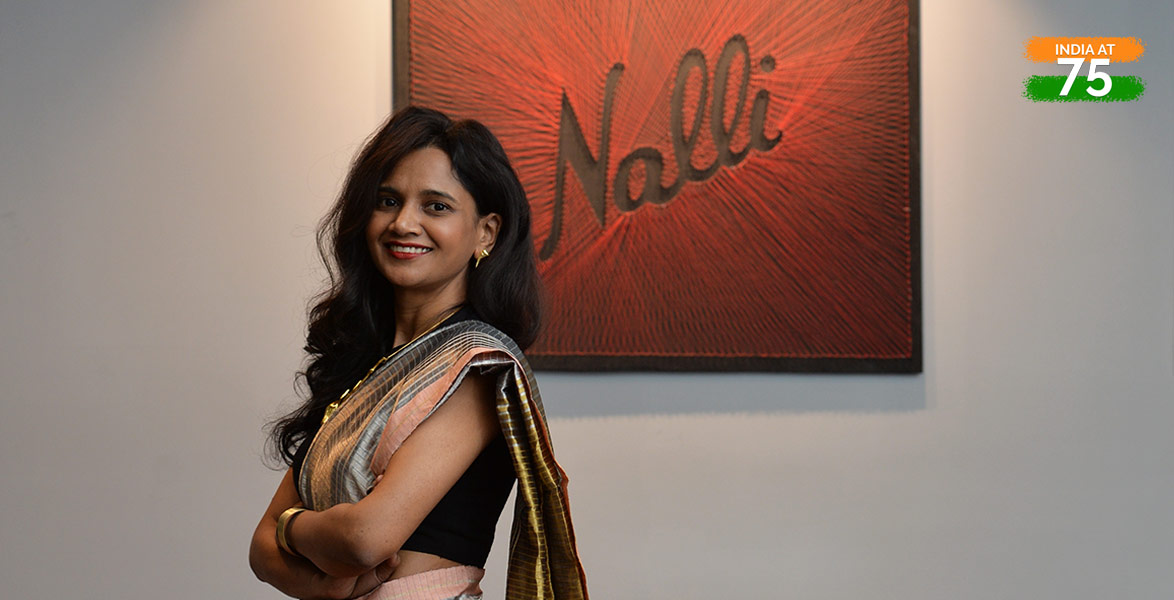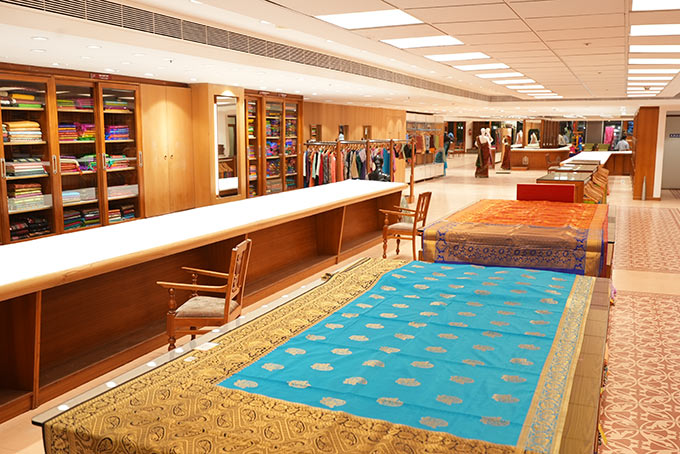
A sari rasika, the vice chair of the 90-year-old Nalli Silks, on threads that bind a family business and e-commerce effluence in India at 75
When she arrives at the Nalli Corporate Office in Bengaluru’s Indiranagar, her high heeled steps are to the rhythm that only the rustle of pure, heavy silk can create. A few lights flash: the tap dancing smile on Lavanya Nalli’s face, the dazzle of gold jewellery on her arms, ears and neck and the amber brightness of the Ganga-Jamuna sari (contrast-colour upper and lower borders) she wears.
A revived version the design from Nalli archives, Lavanya’s attire for ‘Look One’ has a wine-beetroot field with circular gold patterned motifs on it, one border in apple green, another in mauve-maroon. She talks about the woven, two-bordered drape as the weaver’s answer to a ready to wear reversible garment as she settles into a tiny chair in her office turned into a studio for the evening.

Paul Dewars
Where profiles go, this may skid from conventional patterning. Where brand stories go, founded by Nalli Chinnasami Chetty, Nalli Silks, registered in 1928 with the first flagship store in T Nagar, Madras, and is a 90-year old sari behemoth. While no one sari brand in India commands a majority market share, as Lavanya herself points out, Nalli, is inarguably among India’s most storied brands. For narrative storytelling it picks multiple metaphors along the way that stick to its existence in visual memory. Consider this clutch: South India. Kanjeevaram. Wedding saris. Pure silks. Madras. Family Business. Weavers First.
Some are colloquial terms, others identity badges. The silks that fall and hug in thick woven splendour smell like a mix of fragrant jasmine and redolent spices, folded and stacked in stores. The fragrance of incense sticks are is another notion that you may associate with the store. Not to mention salespeople wearing white shirts and veshtis in Chennai, some with sandalwood markings on their head, extending a homogeneous similarity in manner and courtesy to pant-shirt wearing sales staff as far as in Delhi or in Ahmedabad.
As India turns 75 this year, Dr Kuppuswamy Chetty, the well-known textile industrialist and philanthropist, and Lavanya’s grandfather, enters the eighth decade of his life.

G Venkatachala
What E-commerce Did for the Brand
With Niranth Nalli as the president and Lavanya his sister, the vice chairperson, Nalli Silks while still under the mentoring eye of NK Ramanathan, their father, is currently managed by these fifth generation nourishers. It is Lavanya who moved Nalli into e-commerce terrain in 2016, a couple of trial and error years before the hollowing COVID-19 pandemic which would shutter all physical stores, leading to zero sales and a country wide staff of 1,500 plus on rolls to support and enable. “E-commerce was the only glimmer of hope, the shining light in an otherwise dark year,” says Lavanya.
Nalli Silks registered an annual revenue of ₹750 crores before COVID-19 struck. On the other hand, the e-commerce business “tripled in growth in the last fiscal,” she affirms.
The brand which has weaving clusters across the length and breadth of the country currently works with 9,000 entities, of which 2,000-3,000 are constantly active. “From many, we buy up their entire production capacity and provide design inputs,” says Lavanya.
Brand Evolution, Widening of the Bouquet
Over the last few decades, Nalli Silks evolved from the once narrow merchandise category of silk saris from South India to stock weaves from across the country. Zari Banarasis to light printed georgettes and crepes, double Ikat Patolas to hand¬painted muga silks, delicate tanchois to sturdy tangails—no weaving repertoire left unattended. And now, as Lavanya emphasises, Nalli sells dupattas, stoles, pure pashmina shawls, ready to wear garments for men and women, stitched or semi-stitched blouses, yardage, kidswear, pattu pavadai (half-sari) and other accessories. The sari range has flexed too—from embroidered Parsi gara saris to fine, modern linens woven in metallic yarns.
Till date, the 40 odd stores across the country sell an average of 4,000-4,500 saris a day. Bridal Kanjeevarams continue to reign as the most-sought after category. While the store in Delhi’s South Extension market includes among all other weaves even authentic double Ikat Patan Patolas ranging up to ₹2 lakh a piece as well as wedding brocades from Varanasi, the pride of Nalli’s Mumbai stores are its Parsi gara saris and contemporary woven tissues besides the usual fare.
For ‘Look Two’ for this story, Lavanya who calls herself a sari rasika (Tamil and Sanskrit for aesthete) changed into a gorgeous silver-gold metallic woven sari with a salmon pink edge. Her drape crossover from the initial Ganga-Jamuna Kanjeevaram to this contemporary sari is symbolic almost of her transition after a degree at Harvard Business School, followed by work with consulting firm McKinsey & Co in the US and then Indian e-commerce platform Myntra to return to reintegrate with the family business. Specifically, with e-commerce and allied strategies while keeping in mind the DNA of the brand that is “weavers first; a family business built on cultural ideals.”

Paul Dewars
Subtle Messaging, Work-oriented Culture
It is this unambiguous, unflinching fronting of “family”, “frugality”, “discretion” and “let work speak for itself” culture that explains the absence of opinion-led blogs or comments on patriarchy, power and their collision with the current politics of the country on Nalli’s social media handle. To the spectator it appears in fact to be a sari space defined by traditional imagination even when the draping style of the saris is ostensibly modern or the blouse is trendier and styled for the young customer.
Lavanya herself has strong opinions. She admits as much on the periphery of this conversation in her office. Her insights burn bright and strong from feminist mindsets to motherhood (she has a four-and-a-half-year old son) and a closet full of saris that energises her. The brand’s social media handles or website, however are not the forum where the family wants to launch those ideas. Unlike a number of old and new sari and textile brands that now assert their voice and search for customer engagement on social media through dialogue and topical debates.
In the video interview, she talks about a range of immediate concerns – from employee training (saying it works on cultural ideology not corporate ideas) to why the sari continues to survive in India at 75 . She hits her brightest spark at what being a part of a heritage family business means for her. And why every new Nalli store is launched on an auspicious date with her octogenarian grandfather present.
Banner: Lavanya Nalli, at the Nalli Corporate Office in Bengaluru. Photograph: Paul Dewars
This is the first in TVOF’s India At 75 series that will run through the year bringing stories, videos and podcasts on India’s oldest, most laudable cultural institutions, social initiatives, brands and nation-binding ideas.

